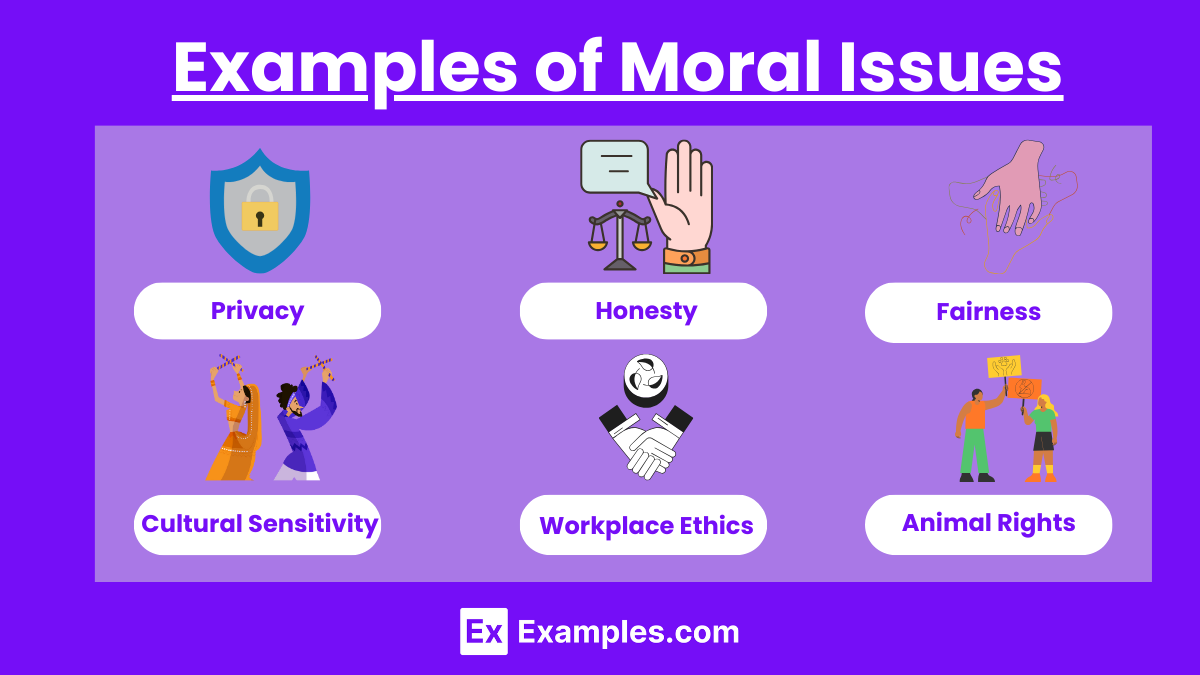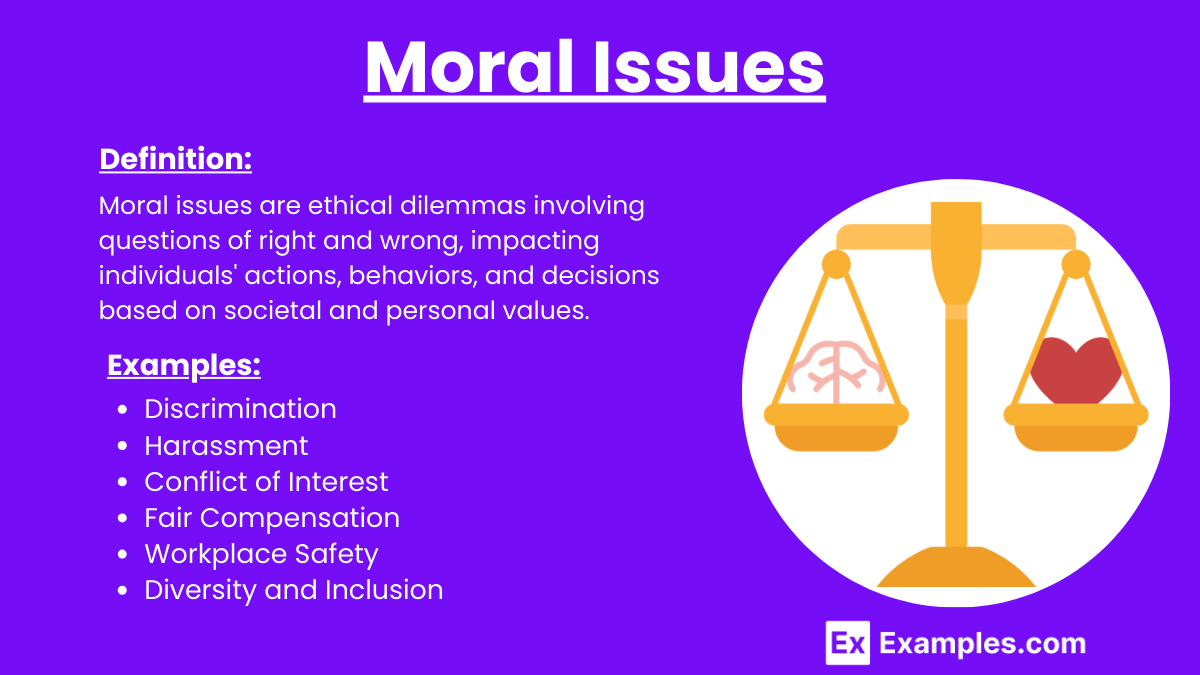16+ Moral Issues Examples to Download
Moral issues are ethical questions that challenge our principles of right and wrong. They often involve a moral dilemma, where individuals must choose between conflicting ethical principles. These dilemmas can arise in various contexts, such as personal relationships, professional environments, and societal norms. Navigating moral issues requires critical thinking, empathy, and a solid understanding of ethical frameworks to make decisions that align with one’s values and promote the greater good.
What is Moral Issues?
Moral issues are conflicts that involve the principles of right and wrong behavior. They require individuals to make decisions that align with ethical standards and values, often involving considerations of justice, fairness, and the welfare of others.
Examples of Moral Issues

- Honesty vs. Loyalty: Choosing between telling the truth and protecting a friend.
- Privacy vs. Security: Balancing individual privacy rights with the need for public safety.
- Fairness vs. Favoritism: Treating everyone equally versus giving preferential treatment to someone special.
- Animal Rights: Deciding on the ethical treatment of animals in research and entertainment.
- End-of-Life Decisions: Addressing ethical concerns in euthanasia and life support.
- Environmental Responsibility: Balancing economic development with environmental conservation.
- Cultural Sensitivity: Navigating cultural differences while maintaining personal ethical standards.
- Workplace Ethics: Handling issues like discrimination, harassment, and integrity in professional settings.
Examples of Moral Issues in the Workplace
- Discrimination – Treating employees unfairly based on race, gender, age, or other characteristics.
- Harassment – Addressing and preventing sexual harassment, bullying, and other forms of workplace harassment.
- Integrity – Ensuring honesty in communications and transactions, avoiding deceit and fraud.
- Conflict of Interest – Managing personal interests that could compromise professional decisions.
- Whistleblowing – Deciding whether to report unethical behavior or misconduct within the organization.
- Fair Compensation – Ensuring employees receive fair wages and benefits for their work.
- Privacy – Respecting employees’ personal information and maintaining confidentiality.
- Workplace Safety – Ensuring a safe working environment through ethical communication and addressing potential hazards..
- Diversity and Inclusion – Promoting a diverse and inclusive workplace culture.
- Labor Rights – Upholding workers’ rights, including fair working hours and conditions.
Types of Moral Issues
- Personal Moral Issues – Decisions affecting one’s integrity, like honesty, loyalty, and responsibility in daily life.
- Social Moral Issues – Ethical dilemmas impacting society, such as justice, equality, and public health.
- Professional Moral Issues – Workplace ethics involving fairness, discrimination, and integrity in professional conduct.
- Environmental Moral Issues – Balancing human needs with environmental conservation and sustainability.
- Cultural Moral Issues – Navigating ethical dilemmas in respecting cultural diversity and maintaining ethical standards.
- Technological Moral Issues – Ethical questions arising from technology use, like privacy and artificial intelligence.
Moral Issues List
- Honesty vs. Loyalty
- Privacy vs. Security
- Fairness vs. Favoritism
- Animal Rights
- End-of-Life Decisions
- Environmental Responsibility
- Cultural Sensitivity
- Workplace Ethics
- Academic Integrity
- Equal Access to Education
- Inclusive Education
- Teacher-Student Relationships
- Bias and Discrimination
- Curriculum Content
- Cheating and Plagiarism
- Bullying and Harassment
- Peer Pressure
- Digital Citizenship
- Inclusivity
- Substance Abuse
- Human Rights Violations
- War and Peace
- Poverty and Inequality
- Environmental Degradation
- Global Health
- Corporate Responsibility
- Moral Relativism
- Utilitarianism vs. Deontology
- Virtue Ethics
- Justice and Fairness
- Autonomy and Consent
- Conflicts of Interest
Moral Issues in Education
- Academic Integrity – Ensuring honesty and preventing cheating, plagiarism, and academic dishonesty.
- Equal Access – Providing all students with equal opportunities and resources for education regardless of their background.
- Inclusive Education -Creating a learning environment that accommodates students with diverse needs and abilities using artificial intelligence.
- Teacher-Student Relationships – Maintaining professional boundaries and fostering a respectful, supportive learning atmosphere.
- Bias and Discrimination – Addressing and preventing bias based on race, gender, or socioeconomic status within educational settings.
- Curriculum Content – Deciding on the ethical inclusion of diverse perspectives and sensitive topics in the curriculum.
Moral Issues for Students
- Cheating and Plagiarism – The ethical implications of dishonesty in academic work.
- Bullying and Harassment – Addressing and preventing harmful behavior towards peers.
- Peer Pressure – Making ethical choices despite facing an ethical dilemma and pressure from friends or classmates..
- Digital Citizenship – Using technology responsibly and ethically, respecting privacy, and avoiding cyberbullying.
- Inclusivity – Treating all classmates with respect and ensuring everyone feels included.
- Substance Abuse – Making informed and ethical decisions about drug and alcohol use.
Moral Issues in the World
- Human Rights Violations – Addressing abuses such as discrimination, torture, and denial of basic freedoms.
- War and Peace – Ethical considerations in conflicts, military interventions, and promoting global peace.
- Poverty and Inequality – Tackling disparities in wealth, access to resources, and opportunities worldwide.
- Environmental Degradation – Combating pollution, climate change, and unsustainable practices harming the planet.
- Global Health – Ensuring equitable access to healthcare, addressing pandemics, and managing medical ethics.
- Corporate Responsibility – Holding businesses accountable for ethical practices, labor rights, and environmental impact is crucial, much like the allegory of a guardian ensuring the well-being of a community.
Moral Issues in Ethics
- Moral Relativism – Debating whether ethical principles are universal or vary across cultures.
- Utilitarianism vs. Deontology – Choosing between outcomes-based ethics (utilitarianism) and duty-based ethics (deontology).
- Virtue Ethics – Focusing on moral character and virtues rather than specific actions addresses social issues through ethical behavior and personal integrity..
- Justice and Fairness – Ensuring equitable treatment and distribution of resources and opportunities.
- Autonomy and Consent – Respecting individuals’ rights to make informed decisions about their own lives.
- Conflicts of Interest – Managing situations where personal interests might compromise professional ethics.
Moral Issues in Society Today
- Racial Inequality – Addressing systemic racism and promoting racial justice and equality.
- Gender Equality – Ensuring equal rights and opportunities for all genders.
- LGBTQ+ Rights – Protecting the rights and dignity of LGBTQ+ individuals.
- Economic Inequality – Tackling wealth disparity and ensuring fair distribution of resources.
- Immigration – Navigating the ethical implications of immigration policies and treatment of immigrants.
- Climate Change – Taking responsible actions to mitigate environmental damage and promote sustainability.
- Gun Control – Balancing the right to bear arms with the need to reduce gun violence.
- Health Care Access – Ensuring all individuals have access to affordable and quality health care.
- Digital Privacy – Protecting individuals’ data and privacy in the digital age is a crucial aspect of ethical considerations. An essay on ethics should explore how to safeguard personal information and ensure privacy in our increasingly digital world..
- Freedom of Speech – Balancing the right to free speech with the need to prevent hate speech and misinformation.
Social Issues vs. Moral Issues
| Aspect | Social Issues | Moral Issues |
|---|---|---|
| Definition | Problems affecting society as a whole | Ethical dilemmas involving principles of right and wrong |
| Examples | Poverty, inequality, unemployment | Honesty vs. loyalty, fairness, integrity |
| Focus | Collective well-being and social structures | Individual behavior and ethical decision-making |
| Scope | Broad, impacting large groups or communities | Often personal, affecting individuals or small groups |
| Resolution | Requires policy changes, social reforms | Requires personal reflection, ethical reasoning |
| Impact | Long-term societal change | Immediate personal or professional consequences |
What is a moral dilemma?
A situation where conflicting ethical principles must be resolved.
How do moral issues affect society?
They influence social norms and collective behavior.
What is an example of a moral issue?
Deciding between honesty and loyalty.
Can moral issues vary across cultures?
Yes, ethical principles can differ based on cultural values.
How are moral issues resolved?
Through personal reflection and ethical reasoning.
What role do moral issues play in education?
They shape academic integrity and inclusive practices.
How do moral issues impact the workplace?
They affect professional conduct and workplace ethics.
What are some common moral issues in technology?
Privacy, data security, and the ethical use of AI.
Why is integrity a moral issue?
It involves maintaining honesty and strong moral principles.
How do moral issues relate to justice?
They influence fairness and equitable treatment.



